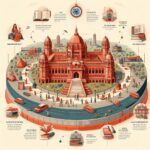Discover the University of Toronto’s country and world rankings, programs, courses, and tuition fees for undergraduate and postgraduate students. Learn more about admissions and university identity.
Table of Contents
University of Toronto: Country Rank 1, World Rank 19, Programs, and Tuition Fees
The University of Toronto (U of T) stands as the premier university in Canada and is recognized globally, ranking 19th worldwide. This article provides an in-depth look at the university’s rankings, overview, identity, location, fields of study, programs, courses, tuition fees, and admissions process.
University Identity
Founded in 1827, the University of Toronto is a public research university located in Toronto, Ontario, Canada. U of T is renowned for its research excellence, innovative programs, and commitment to providing high-quality education, making it a top choice for students from around the globe.
The university is a member of the Association of American Universities, an elite group of research-intensive North American institutions. U of T’s alumni include notable figures such as four Canadian prime ministers, including Lester B. Pearson and Stephen Harper, and numerous business leaders, scholars, and artists.
Country and World Rank
The University of Toronto consistently ranks as the best university in Canada and is among the top universities globally. According to the QS World University Rankings 2024, it is ranked 19th in the world. This ranking reflects the university’s strong academic reputation, impactful research, and overall excellence in higher education.
University Location
The University of Toronto operates across three campuses, each with its unique character and strengths:
- St. George (Downtown Toronto): The largest and oldest campus, St. George is located in the heart of Toronto. It is home to many of the university’s faculties and research institutes, including the Faculty of Arts and Science, the Faculty of Law, and the Rotman School of Management.
- Scarborough (UTSC): Known for its co-op programs and vibrant student life, UTSC offers a dynamic and diverse learning environment. The campus features the Bladen Wing, the Science Research Building, and the Highland Hall.
- Mississauga (UTM): UTM offers a unique blend of undergraduate and graduate programs with a focus on interdisciplinary studies. The campus is known for its beautiful, park-like setting along the Credit River and its state-of-the-art facilities like the Terrence Donnelly Health Sciences Complex.
Fields of Study / Degree Levels
The University of Toronto offers a comprehensive range of undergraduate, graduate, and professional programs across various fields of study. Some key areas of study include:
- Arts and Humanities: English, History, Philosophy, Visual Arts, etc.
- Sciences: Physics, Chemistry, Biology, Environmental Science, etc.
- Engineering and Technology: Civil Engineering, Mechanical Engineering, Computer Science, Electrical Engineering, etc.
- Business and Economics: Finance, Marketing, Economics, Management, etc.
- Health Sciences: Medicine, Nursing, Public Health, Pharmacy, etc.
- Law: Juris Doctor (JD), Master of Laws (LLM), Doctor of Juridical Science (SJD), etc.
- Education: Bachelor of Education (BEd), Master of Education (MEd), Doctor of Education (EdD), etc.
- Environmental Studies: Environmental Science, Sustainability, etc.
Programs and Courses
U of T’s programs are designed to cater to a wide array of academic interests and career aspirations. Some notable programs include:
Undergraduate Programs
| Program | Degree | Description |
|---|---|---|
| Arts | BA | Covers a wide range of humanities and social science disciplines, including History, English, Philosophy, and Sociology. |
| Science | BSc | Encompasses subjects like Biology, Chemistry, Physics, and Environmental Science, focusing on both theoretical and practical aspects. |
| Commerce | BCom | Provides a comprehensive understanding of business principles, economics, accounting, and management. |
| Engineering | BEng | Includes specializations like Civil, Mechanical, Electrical, and Computer Engineering, emphasizing problem-solving and innovation. |
| Music | BMus | Offers training in performance, music theory, history, and education. |
Graduate Programs
| Program | Degree | Description |
|---|---|---|
| Arts | MA | Advanced study in humanities and social sciences, allowing for specialization and research opportunities. |
| Science | MSc | Focuses on scientific research and advanced knowledge in fields such as Physics, Chemistry, and Biological Sciences. |
| Business | MBA | Designed to develop leadership skills and business acumen, covering finance, marketing, operations, and strategy. |
| Engineering | MEng | Advanced engineering courses and projects, with a focus on innovation and research in various engineering disciplines. |
| Education | MEd | Prepares educators and administrators for advanced roles in education, focusing on curriculum development, leadership, and policy. |
Professional Programs
| Program | Degree | Description |
|---|---|---|
| Medicine | MD | Comprehensive medical training that prepares students for careers as physicians, covering clinical practice and medical research. |
| Law | JD | Provides a solid foundation in legal principles and practice, preparing students for careers in law and judiciary. |
| Pharmacy | PharmD | Focuses on pharmaceutical sciences, patient care, and clinical practice. |
| Dentistry | DDS | Trains students in dental sciences, patient care, and clinical practice. |
| Social Work | MSW | Prepares students for advanced social work practice, focusing on clinical and community-based interventions. |
Course Descriptions
Undergraduate Courses
- Bachelor of Arts (BA)
- English: Study of literature, language, and writing, with courses ranging from classical literature to modern fiction and critical theory.
- History: Exploration of historical events, cultures, and societies from ancient to contemporary times.
- Philosophy: Examination of fundamental questions about existence, knowledge, and ethics, with courses in logic, metaphysics, and ethics.
- Sociology: Analysis of social behavior, institutions, and structures, including courses on social theory, inequality, and urban studies.
- Bachelor of Science (BSc)
- Biology: Study of living organisms, including genetics, ecology, and molecular biology.
- Chemistry: Examination of chemical substances and processes, with courses in organic, inorganic, and physical chemistry.
- Physics: Exploration of the fundamental principles of the universe, including courses in mechanics, electromagnetism, and quantum physics.
- Environmental Science: Study of the environment and solutions to environmental problems, with courses in ecology, climate change, and conservation.
- Bachelor of Commerce (BCom)
- Finance: Study of financial markets, investment strategies, and corporate finance.
- Marketing: Examination of market research, consumer behavior, and advertising strategies.
- Economics: Analysis of economic theory, policy, and global economic systems.
- Management: Study of organizational behavior, leadership, and strategic management.
- Bachelor of Engineering (BEng)
- Civil Engineering: Design and construction of infrastructure projects such as bridges, roads, and buildings.
- Mechanical Engineering: Study of mechanical systems, including courses in thermodynamics, fluid mechanics, and materials science.
- Electrical Engineering: Examination of electrical systems and devices, with courses in circuit design, electromagnetism, and power systems.
- Computer Engineering: Study of computer hardware and software, including courses in programming, algorithms, and systems design.
- Bachelor of Music (BMus)
- Performance: Training in vocal or instrumental performance, with opportunities for solo and ensemble work.
- Music Theory: Study of the structure and elements of music, including harmony, melody, and rhythm.
- Music History: Exploration of the development of music from different periods and cultures.
- Music Education: Preparation for careers in teaching music, including courses in pedagogy and curriculum design.
Graduate Courses
- Master of Arts (MA)
- English: Advanced study of literature, critical theory, and cultural studies.
- History: In-depth exploration of specific historical periods, regions, and themes.
- Philosophy: Advanced examination of philosophical issues, including ethics, logic, and metaphysics.
- Sociology: Advanced analysis of social phenomena, including research methods and theoretical frameworks.
- Master of Science (MSc)
- Physics: Advanced study of physical principles, with opportunities for research in areas such as condensed matter, astrophysics, and particle physics.
- Chemistry: In-depth exploration of chemical processes, with research opportunities in organic, inorganic, and physical chemistry.
- Biological Sciences: Advanced study of biological systems, including genetics, ecology, and molecular biology.
- Environmental Science: Advanced study of environmental issues, with research opportunities in areas such as climate change, conservation, and sustainability.
- Master of Business Administration (MBA)
- Finance: Advanced study of financial management, investment strategies, and corporate finance.
- Marketing: In-depth exploration of marketing strategies, consumer behavior, and brand management.
- Operations: Study of production and operations management, including supply chain management and process optimization.
- Strategy: Examination of strategic planning and management, with a focus on competitive analysis and business development.
- Master of Engineering (MEng)
- Civil Engineering: Advanced study of civil engineering principles and practices, with opportunities for research in areas such as structural engineering, transportation, and environmental engineering.
- Mechanical Engineering: In-depth exploration of mechanical systems, including research opportunities in areas such as robotics, materials science, and energy systems.
- Electrical Engineering: Advanced study of electrical systems and devices, with research opportunities in areas such as power systems, telecommunications, and signal processing.
- Computer Engineering: Advanced study of computer hardware and software, with research opportunities in areas such as artificial intelligence, cybersecurity, and software engineering.
- Master of Education (MEd)
- Curriculum Development: Study of curriculum design, implementation, and evaluation.
- Educational Leadership: Examination of leadership theories and practices in educational settings.
- Policy Studies: Analysis of educational policies and their impact on schools and communities.
- Special Education: Study of educational strategies for students with diverse learning needs.
Tuition Fees
Tuition fees at the University of Toronto vary by program and level of study. Below is a general overview of the tuition fees for the 2023-2024 academic year:
| Program | Undergraduate (CAD/year) | Graduate (CAD/year) |
|---|---|---|
| Arts and Science | $6,100 – $14,180 | $7,680 – $28,890 |
| Commerce | $15,900 – $24,300 | $8,810 – $60,320 |
| Engineering | $14,180 – $16,150 | $10,550 – $36,970 |
| Music | $6,100 – $14,180 | $7,680 – $28,890 |
| Medicine | N/A | $23,760 – $40,240 |
| Law | N/A | $14,040 – $39,820 |
| Pharmacy | N/A | $11,650 – $35,600 |
| Dentistry | N/A | $24,180 – $56,290 |
| Social Work | N/A | $8,880 – $19,200 |
Admission Details
The admission process at the University of Toronto is competitive, and applicants are assessed based on their academic achievements, extracurricular activities, and personal statements. Below are the general admission requirements for undergraduate and graduate programs:
Undergraduate Admission Requirements
- High School Diploma: Completion of a recognized high school diploma or equivalent.
- Grade Point Average (GPA): A competitive GPA, typically around 3.0 or higher on a 4.0 scale.
- Standardized Tests: Submission of SAT or ACT scores for applicants from the United States.
- English Language Proficiency: Proof of English language proficiency for non-native English speakers, usually through TOEFL or IELTS scores.
- Supplementary Application: Some programs may require additional materials such as essays, portfolios, or interviews.
Graduate Admission Requirements
- Bachelor’s Degree: Completion of a recognized bachelor’s degree or equivalent.
- Grade Point Average (GPA): A competitive GPA, typically around 3.0 or higher on a 4.0 scale.
- Standardized Tests: Submission of GRE or GMAT scores for certain programs.
- English Language Proficiency: Proof of English language proficiency for non-native English speakers, usually through TOEFL or IELTS scores.
- Letters of Recommendation: Submission of letters of recommendation from academic or professional references.
- Statement of Purpose: A personal statement outlining the applicant’s academic and career goals.
- Research Proposal: For research-based programs, submission of a research proposal may be required.
Conclusion
The University of Toronto stands as a beacon of academic excellence, offering a diverse range of programs and courses designed to cater to various academic interests and career aspirations. With its top-tier rankings, vibrant campus life, and commitment to research and innovation, U of T provides an unparalleled educational experience for students from around the world.
For more information on programs, admissions, and tuition fees, visit the University of Toronto’s official website.

